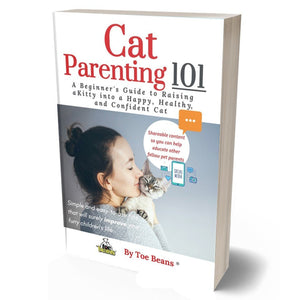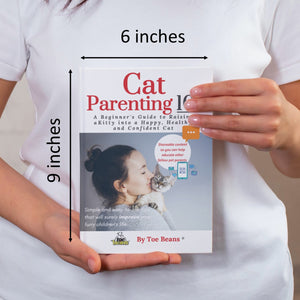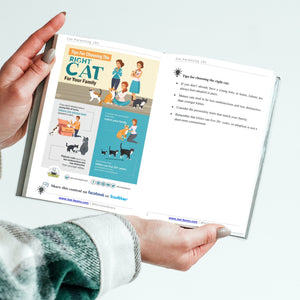Your Cart is Empty




Cat Books | Cat Parenting 101 | Paperback Format
A BEGINNER'S GUIDE ON HOW TO RAISE A KITTEN INTO A HAPPY, HEALTHY, & CONFIDENT CAT BY TOE BEANS®
$12.80
🚚 FREE Shipping on all orders
Are you planning on growing your family? Thinking of bringing in a furry family member? A cat maybe? Perhaps you are a first-time cat parent? Or maybe you are planning on providing some temporary foster care for cats?
Whether you are an experienced pet parent or a rookie, you will find this must-have guide very useful. This handy 50-page easy-to-read book contains more than 20 years of pet parenting experience and countless hours of research on how to raise a cat.
Scroll down to learn more about Cat Parenting 101, or check out other cat and dog 101 book titles. Available in both eBook and paperback.
Secure checkout powered by Trustedsite.
Why Cat Parenting 101?

MISSION DRIVEN
We believe that educated pet parents make better decisions for their fur children.
Bringing this book to you is an important building block of the toe beans mission to improve the life of every fur child via pet parent education.

DOWNLOADABLE CHECKLISTS
This simple guide will equip pet parents with an instructive, organized, and trackable step-by-step approach to integrating a new cat into their family. Every checklist can be downloaded and printed from our website.

GREAT FAMILY READ
This cat parenting guide is sassy, entertaining and speckled with humor. Tips sections and checklists provide a framework for engaging family members in the loving care of your fur children.

GET IT FOR FREE
You can get any of the books in our pet parents’ dog and cat book series for free. Both the eBook and the paperback versions of Cat Parenting 101 are FREE with the purchase of eligible product bundles. Scroll down to the “Get it for Free” section for instructions.

IN FULL COLOR
This 58-page cat parenting guide is filled with beautiful colorful pictures and one-click social media shareable educational illustrations.
About Cat Parenting 101
Written at an 8th-grade reading level, this 12-chapter cat parenting guide is intended to cover the basics - and a little more - about how to raise a kitten.
From how to choose the right kitty for your family, to how to prepare your home for the new arrival, to making sure your kitty enjoys every vet visit. I‘ve got you covered.
You’ll also learn about making food choices and best practices for encouraging good litter box habits. The book also teaches you what you can expect for your regular veterinary care and the all-important play and exercise, among other key topics.
At the end of this book, we wrap everything up with three useful checklists every pet parent should have on hand.
Happy reading!
Who Should Read Cat Parenting 101?
Cat Parenting 101 May Be A Great Read For You If:
✔️ You're planning on becoming a new cat parent
✔️ You're a new cat mom or dad
✔️ You simply love cats and want to brush up on your cat parenting skills
✔️ You're interested in temporary foster care for cats
✔️ You're an animal rescue volunteer
✔️ You have a young or teenage child wanting a kitty this book will be a great educational tool
✔️ You happen to find yourself in a situation where you are taking care of an orphaned kitten
Cat Parenting 101 may not be a good read for you if you’ve already raised your cat to adulthood or if you're an experienced cat parent.
The Dog & Cat Pet Parent Book Series by Toe Beans
✔️ Cat Parenting 101 is part of the Pet Parents 101 Book series, a fun, educational, and practical easy-to-read 12-book series on dog and cat care basics.
✔️ An important building block of the toe beans mission, the series is intended for every beginner pet parent, pet care giver, and cat & dog lover wishing to learn the basics or simply polish their pet care skills and improve the life of their furry child/foster/friend.
✔️ Written for all ages, every book in the series makes for a great opportunity to get the entire family involved in the loving care of furry family members.
✔️ Want it for FREE? No problem. All the books in our pet parents' dog and cat book series are free with eligible product bundles.
✔️ Fun for all ages from young children to adults.
✔️ At toe beans we believe in the power of love and joy animals bring to our lives. In return, we are devoting a lot of resources to ensure this series (still in the making) makes a small contribution to improving your furry children/friends' lives.
In Paperback & eBook Versions
✔️ Cat Parenting 101 is conveniently available in paperback and eBook.
✔️ Both versions are FREE with the purchase of eligible product bundles.
✔️ Whether you're an old-school book reader or prefer to read on your computer, tablet, or phone, we’ve got you covered.
✔️ Check out the advantages and disadvantages of each format in the chart.
✔️ A cool feature of the paperback option is that they can be autographed upon request and at no cost.
✔️ A short 100 words can also be handwritten. This unique feature makes for a great gift for somebody that has made the wonderful decision to become a dog parent for the first time.
Want Cat Parenting 101 for Free?
How to get the eBook version for FREE:
✔️ Purchase our Organic Ecstasy bundle:
- Momma KNows Best USDA certified organic 3-pack catnip
- USA-made, BPA free dog & cat wet-food saving can lids
- Cat Parenting 101 eBook
(Save time - click here to automatically add all 3 items to your cart.)
✔️ Hit checkout then enter coupon code: CPE to make the eBook FREE.
Rather get the paperback version instead?
✔️ Purchase our Organic Ecstasy PLUS bundle:
- Momma Knows Best USDA certified organic 3-pack catnip
- USA-made, BPA free dog & cat wet-food saving can lids
- Your choice of Momma Knows Best USDA organic moisturizing balm
- Cat Parenting 101 - paperback
(Save time - click here to automatically add all 4 items to your cart.)
✔️ Hit checkout then enter coupon code: CPP to make the eBook FREE.
About the Author
K. Marie Alto is a fur mom, wife, wannabe writer, blogger, and the co-founder and Chief Fur Children Happiness Officer at toe beans.
With over 20 years of experience as a pet momma, K. Marie loves sharing her personal journey and experience as a pet parent via her blog and Facebook page where she currently has more than 30K followers (@furrytoebeans) and counting.
Driven by her mission to improve the lives of every fur child, K. Marie dreams of a world with happier, more active, healthier, and longer living fur children in every home.
She believes that safety of pet products should be every pet parent’s #1 priority. Purchasing products that are truly safe for dogs and cats can be a challenge in the wild west of the pet products industry. That’s why she is committed to educating pet parents to make smart purchasing decisions on behalf of their beloved fur children.
Toe Beans is a US based ecommerce direct to consumer pet products online boutique.
PET PARENT EDUCATION
Cat Parenting FAQs
-
Introducing a new kitten to your home requires patience and careful planning. Set up a designated safe space with food, water, litter box, and comfortable bedding. Gradually introduce the kitten to other areas of the home, one room at a time. Supervise interactions with other pets and gradually increase their time together. Provide plenty of love, attention, and positive reinforcement to help your kitten adjust.
-
Kittens have specific nutritional needs for growth and development. Choose high-quality kitten food that is specially formulated to meet their requirements. Look for labels that indicate the food is "complete and balanced" for kittens. Consult your veterinarian for specific dietary recommendations based on your kitten's breed, age, and health.
-
Kittens require frequent meals due to their small stomachs and high energy levels. Feed your kitten small, frequent meals throughout the day, usually three to four times a day. Follow the feeding guidelines on the food packaging and adjust portions as your kitten grows. As they reach adulthood, you can transition to feeding them two meals a day.
-
Litter training your kitten is relatively easy. Start by placing them in the litter box after meals and naps, as well as when they show signs of needing to eliminate. Use a litter that is safe for kittens and maintain a clean litter box by scooping it daily. If accidents happen, avoid punishment and clean up with an enzymatic cleaner to remove the odor and discourage repeat incidents.
-
Vaccinations are crucial for protecting your kitten from diseases. Schedule a visit to the veterinarian to start vaccinations around 6-8 weeks of age. Core vaccinations for kittens typically include those for feline distemper (panleukopenia), feline viral rhinotracheitis, and feline calicivirus. Your veterinarian will create a vaccination schedule based on your kitten's specific needs.
-
Scratching is a natural behavior for cats. Provide your kitten with appropriate scratching posts or pads and encourage their use by placing them near furniture or areas they tend to scratch. Use positive reinforcement, such as treats or playtime, when your kitten uses the scratching post. Trim their nails regularly and consider using soft nail caps to protect furniture.
-
Spaying or neutering your kitten is important to prevent unwanted litters and certain health issues. The ideal age for spaying or neutering varies, but it is typically done between 4-6 months of age. Consult your veterinarian to determine the best timing for your kitten based on their breed, size, and overall health.
-
Play and exercise are essential for a kitten's physical and mental development. Engage in interactive play sessions using toys that stimulate their natural hunting instincts. Provide opportunities for climbing, exploring, and chasing. Be cautious not to overexert your kitten, as they may tire easily. Gradually increase playtime as they grow and adjust to their energy levels.
-
Socialization is important for a well-adjusted and friendly cat. Expose your kitten to various people, animals, and environments in a positive and controlled manner. Allow them to explore and interact with new experiences gradually. Provide positive reinforcement, treats, and praise for calm and confident behavior. Enroll in kitten socialization classes or seek guidance from your veterinarian on proper socialization techniques.
-
Grooming your kitten helps maintain their coat and promotes bonding. Start by introducing gentle brushing sessions using a soft brush or comb appropriate for their fur type. Gradually increase the duration of grooming sessions as your kitten becomes more comfortable. Check their ears, teeth, and nails regularly, and seek professional grooming assistance if needed.
-
Training your kitten to use a scratching post involves positive reinforcement and redirection. Encourage them to use the post by placing treats or toys near it. When they start scratching furniture, gently redirect them to the post and reward them when they use it. Be patient and consistent with training, and avoid punishment.
-
The transition from kitten food to adult cat food depends on your kitten's breed and growth rate. Generally, you can start transitioning to adult cat food around 9-12 months of age. Gradually mix increasing amounts of adult food with the kitten food over a week or two until they are solely eating adult cat food.
-
Ensure your home is safe for your curious kitten by removing hazards. Secure electrical cords, toxic plants, strings of any kind, and chemicals out of reach. Keep small objects, choking hazards, and plastic bags away from them. Provide a safe and supervised environment for play and exploration, and monitor their interactions with household items.
-
Being aware of the signs of illness in kittens is important for early detection and prompt veterinary care. Watch for changes in appetite, litter box habits, energy levels, coat condition, and behavior. Diarrhea, vomiting, coughing, sneezing, or nasal discharge can also indicate illness. If you notice any concerning symptoms, consult your veterinarian for a proper diagnosis and treatment.
-
Introducing your kitten to other pets requires a gradual and supervised process. Start by allowing them to sniff each other's scents without direct contact. Then, gradually introduce controlled interactions, such as through a baby gate or a crack in the door. Monitor their behavior closely and provide positive reinforcement for calm and friendly interactions. Seek guidance from a professional if needed.
-
Kittens may be prone to chewing on cords and household items. Protect cords by covering them or using deterrent sprays with safe ingredients. Provide plenty of appropriate chew toys to redirect their chewing behavior. Keep valuable or hazardous items out of reach, and supervise your kitten to prevent chewing accidents.
-
Kittens need plenty of sleep for proper growth and development. Provide a comfortable and quiet sleeping area where they can retreat undisturbed. Allow them to nap and sleep as needed, as kittens have high energy levels but also require adequate rest. Avoid disturbing their sleep and establish a consistent routine.
-
Kittens may exhibit rough play behavior, including scratching and biting. Use interactive toys and play techniques that discourage such behavior. Avoid using your hands or feet as play objects, as this can encourage biting. If your kitten becomes too aggressive during play, redirect their attention to appropriate toys and reward calm behavior.
-
Introducing dental care early is beneficial for your kitten's long-term oral health. Start brushing their teeth using a toothbrush and toothpaste specially designed for cats. Begin with short, gentle sessions, gradually increasing the duration. Make it a positive experience by rewarding them with treats or praise. Regular brushing helps prevent dental issues and allows you to monitor their oral health.
-
To help your kitten adjust to the litter box, ensure it is easily accessible and in a quiet area. Show them the litter box after meals and naps. If accidents occur, place the soiled material in the litter box to establish the proper scent association. Clean the litter box regularly and avoid using strong-scented litter.











